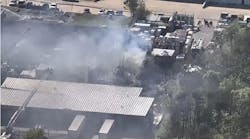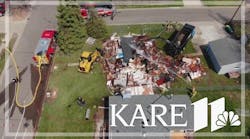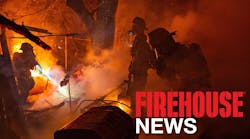Are you a leader or a manager? A question that is often asked of aspiring officers in the fire service as if being one automatically excludes an officer from being both.
Fire service history is replete with examples of individuals who were "strong leaders" on the emergency incident scene with powerful "command presence" and a reputation that garnered tremendous respect. Well deserved.
There are also examples of individuals who "managed" fire departments with considerable administrative prowess, known for wringing every available dollar out of the government to accomplish goals and objectives. Equally important.
The problem in both of these cases is that while an individual might possess certain skills as a leader or a manager, they incorrectly attempt to apply the principles of one to the other and in doing so, fail miserably. The goal of this article is to attempt to put this issue to rest by defining the circumstances under which an individual (in this case an officer of any rank) might have to apply leadership principles and/or management principles.
The fundamental difference between leadership and management is that people are led and programs are managed. Have you ever seen an accountability system led? Ever attempted to "manage" a discussion among a group of firefighters on the pro's and con's of a particular topic around the coffee table? Although these examples may seem absurd, the fact of the matter is that successful officers need to have skills in both management and leadership and most importantly know when to employ them to accomplish common organizational and personal goals.
The concept of leadership is based on the fundamental idea of convincing people with different goals and objectives to work together for a common goal or set of goals. Simply put, people want to be led. Your firefighters, more than anything else, want to know that someone is the boss and when it comes time to make critical decisions involving their lives, the boss is going to make decisions that will ensure their safety and well-being. With strong leadership absent from a formal leader (lieutenant, captain, chief) firefighters will seek out their own informal leader who is willing to make decisions and follow that individual. Leadership is really about three basic principles: defining expectations, getting out of the way, and positive re-enforcement/corrective action when necessary.
Firefighters show up wanting to know what is expected of them. I have known career and volunteer departments alike where the expectations were so low that people spent most of their time looking for the basement door to get out. Likewise, I have known career and volunteer departments where the expectations placed upon the members were extremely high (mandatory certification, annual re-certification, annual physicals, training, adherence to policies and procedures). These departments are shining examples of what happens when a leader does an excellent job of letting firefighters know, up front, what will be expected of them.
The idea is simple: if you want to ride this train, here is the cost and here are the rewards - no questions asked. If you want to ride, there is room for all but the train is leaving the station. If you do not want to get on board, no harm; Once on board, however, the expectations for membership are clear. As an officer you cannot measure the success of your people if you have not defined the measurement parameters. Are you going to measure with a ruler, a yardstick, or a measuring tape? The choice you make will determine the speed and strength of your train. The most unique characteristic about firefighters (and one that is all too often overlooked) is that given a task and a challenge and the opportunity to be successful, expectations will not only be met, they will be exceeded by a group of individuals driven to success.
Once defined, the next important task is to get out of the way. Don't get off the train and think that it is going to drive itself. Rather, never forget that you are the engineer. The key here is simple: once you have set into motion the people and defined expectations, give them a chance to succeed by allowing them to do their job! In this example, the idea would be that while at the controls of the train, you (the officer) are suddenly stricken by a medical emergency and fall to the floor of the locomotive. One of your people should step over you, grab the controls and continue to drive the train while calling for EMS to carry you to an area where you can be helped. Officers should never view their position in an organization as so crucial that they replace their own sense of self-importance over the organization itself. This is dangerous because it breeds a generation of mindless drones who cannot respond when catastrophe befalls the self-important leader in time to stop the train from running off its tracks and crashing. In this case, the train can be as small as a single company (engine, truck, squad), a division (training, fire marshal's office, maintenance) or the entire department.
The final piece of the puzzle is to be honest and direct when your people (and they are your people) do a good job or need correction. Go back to defining expectations. Be up front at the beginning about the circumstances under which you are going to take corrective action and what that corrective action will look like. For example, the conversation might sound like this: "Here are things that I expect (X,Y,Z) and here are the things that are going to cause you and I have to meaningful conversation (A,B,C) and you should know that when we do need to have that conversation, you will hear it directly from me and I will look you squarely in the eye, we will discuss it, and then we will move on".
Be careful about meaningful conversation - never forget that you are leading human beings - they (like you) are going to make mistakes. The key is not to shoot them down when they make a mistake. The key is to get them to accept responsibility for making a mistake and then take whatever corrective action is needed to reduce the chance of the mistake happening again. They key is not avoid making a mistake - the key is to avoid making the same one twice. Make new ones. Finally, praise often and openly. When your people do a great job - tell them. And then tell other people. Whether they are willing to admit it or not, most firefighters not only want to do a great job - they appreciate hearing it from an officer who they respect.
Programs are managed. Resources are managed. A considerable number of fire service pundits would like to claim that firefighters are in fact human resources and as such need to be managed. I disagree. The danger in subscribing to this theory is that it reduces your firefighters to a quantity - a widget. An effective manager is able to look at a series of competing initiatives, prioritize them, and make important decisions about the order in which they are going to be accomplished. Often these are difficult decisions that almost always centered on the concept of where to apply limited resources (money).
And inevitably, subordinates not charged with this serious responsibility, might be inclined to second guess the manager or even worse view the decisions made in a zero-sum format identifying winners and losers. Managers should be mindful of this eventuality but should not lose any sleep over it - the only thing that is guaranteed is that people are going to talk about you. What is important is to establish a set of criteria for making such decisions, sharing them, and then most importantly, following them. For example, three excellent criteria include firefighter safety, improving customer service, and maximizing existing resources. Another example once shared by a fire chief I know centered on the question, "Can we afford a line-of-duty-death?", which replaced the age-old statement: "We can't afford that". Changing the question changed the paradigm by which all managerial decisions might have to be made.
Effective leaders elevate their people to a level above that of resources. Firefighters are not fire engines - they are infinitely more valuable. Leadership is about defining expectations, getting out of the way, and praising often. Strong managers establish a set of criteria to make difficult decisions and then follow them, all the while remaining open to new ideas and alternative ways to solving problems. The fire service needs strong managers with effective leadership skills. All of these qualities can be found in a single person - perhaps you. The train is leaving - are you getting on-board?
Next time: Do you want the football?
Matthew Tobia is a Captain with the Anne Arundel County Fire Department in suburban Baltimore, MD. With more than 18 years of experience, Captain Tobia is currently working as the station commander at the Department's newest fire station located in Severn (Station # 4).
Captain Tobia holds a B.S. from the University of Maryland and is a nationally certified Fire Officer III and Instructor II. He teaches extensively throughout the United States and is an adjunct instructor at the Pennsylvania State Fire Academy. He has served on curriculum development teams in Maryland and Pennsylvania.
Captain Tobia is active in supporting the National Fallen Firefighters Foundation and the Mid-Atlantic Burn Camp for Children. He can be reached at [email protected].





